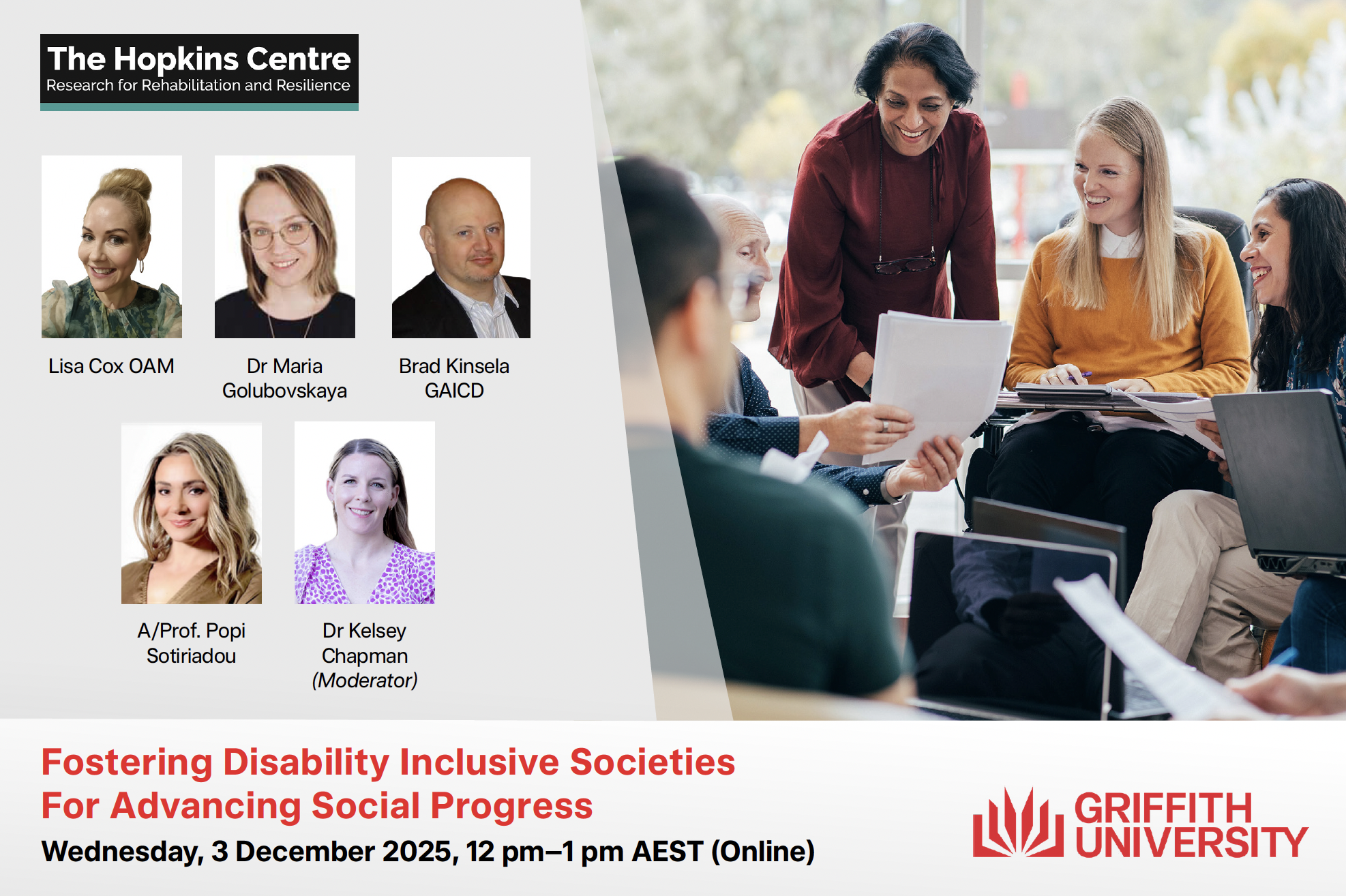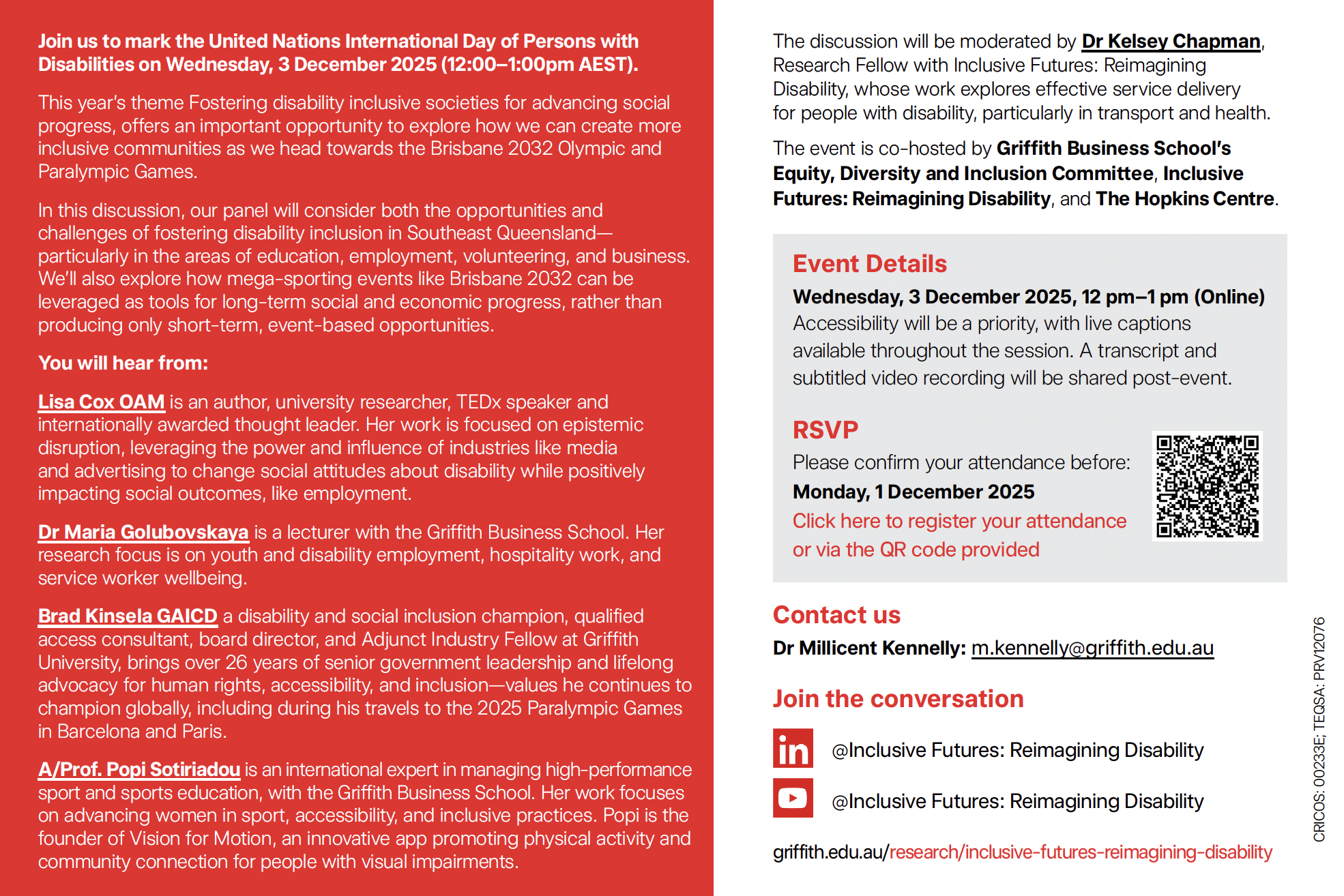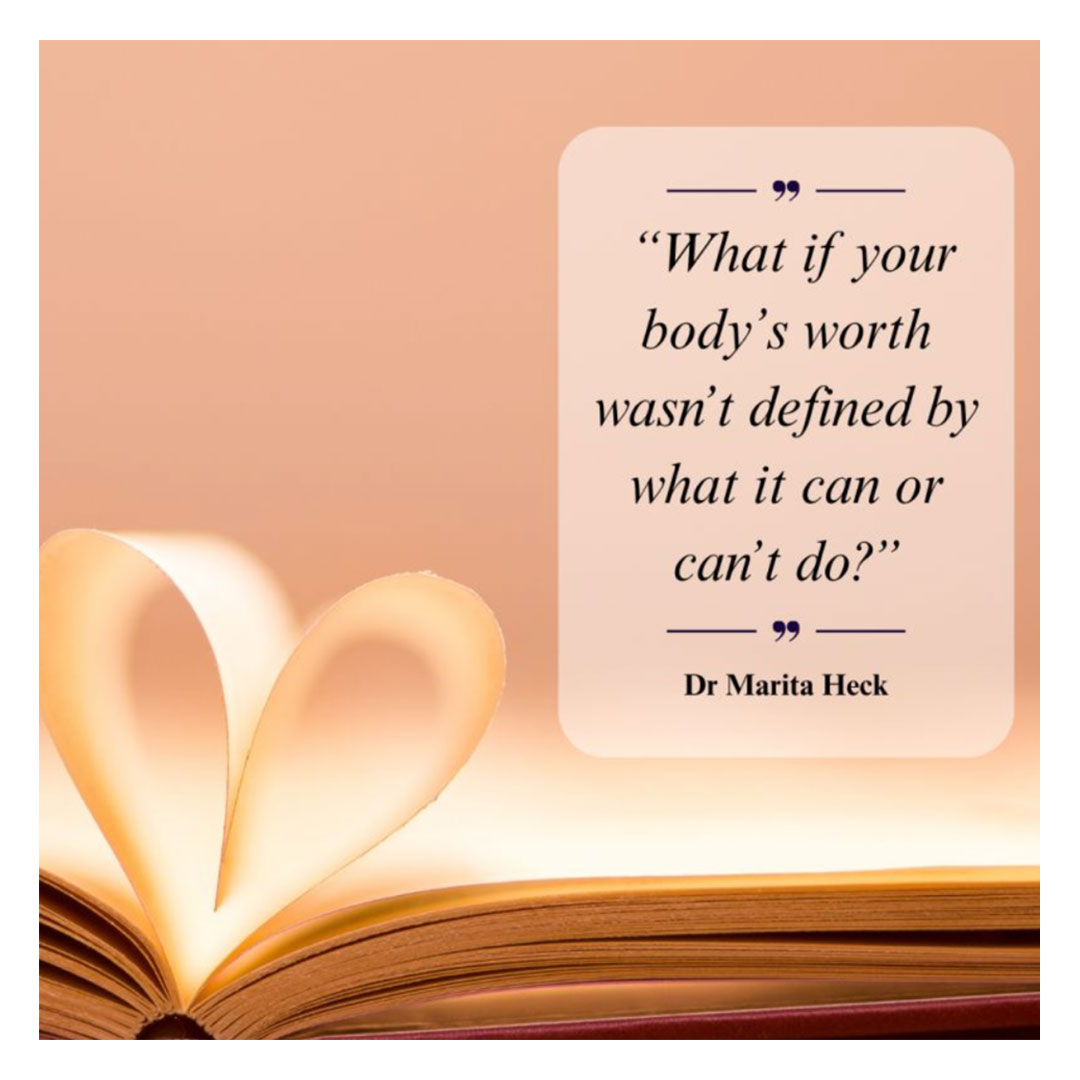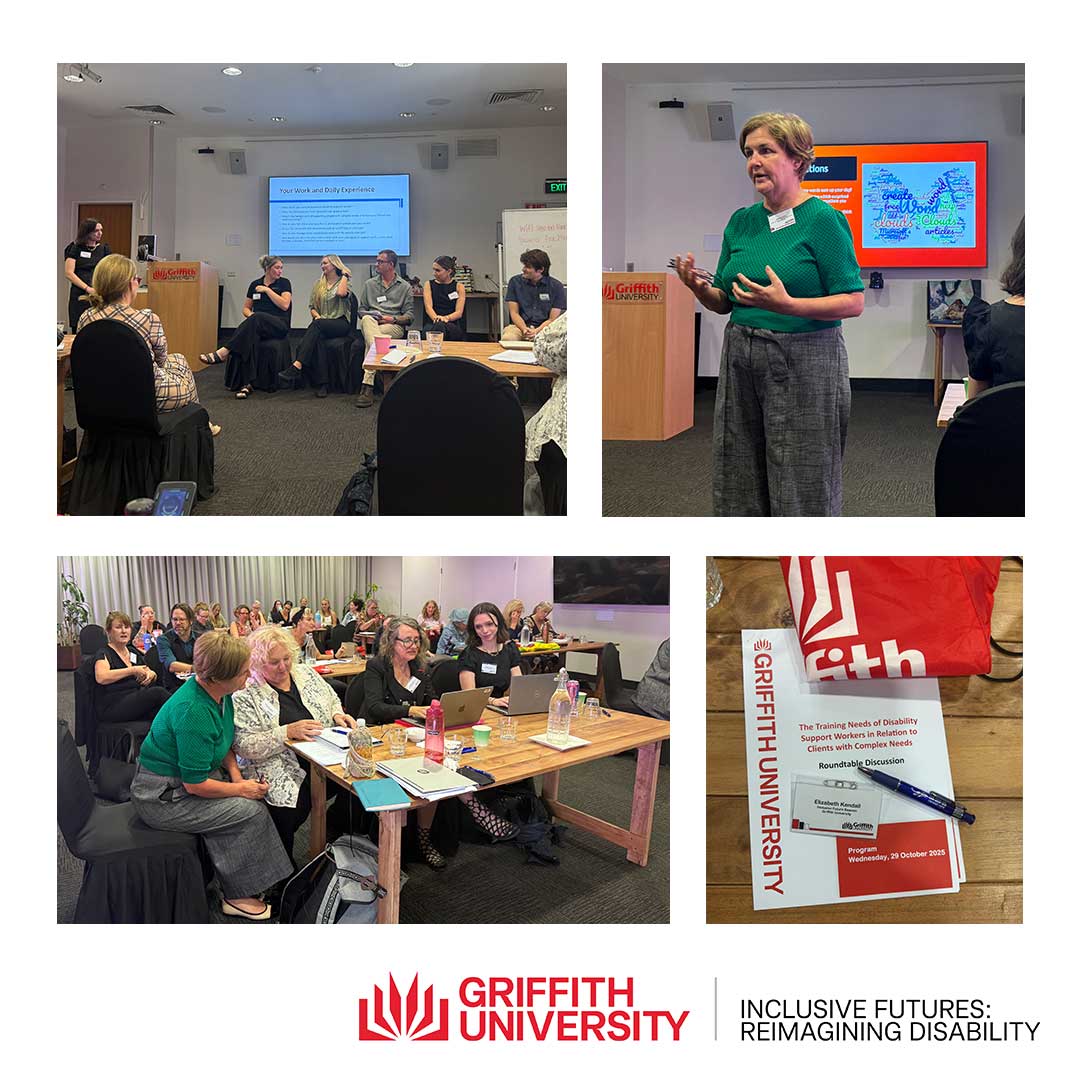Latest News

Check out the latest newsworthy and noteworthy things happening with Inclusive Futures, our partners and colleagues, and anything else you will need to know. We regularly add stories, grant opportunities, and announcements here. If you have something to share, please email inclusivefutures@griffith.edu.au
Check out the latest newsworthy and noteworthy things happening with Inclusive Futures, our partners and colleagues, and anything else you will need to know. We regularly add stories, grant opportunities, and announcements here. If you have something to share, please email inclusivefutures@griffith.edu.au
-
Disability Action Week: Sleep and Spinal Cord Injury: What You Need to Know
Share Disability Action Week: Sleep and Spinal Cord Injury: What You Need to Know on Facebook Share Disability Action Week: Sleep and Spinal Cord Injury: What You Need to Know on Twitter Share Disability Action Week: Sleep and Spinal Cord Injury: What You Need to Know on Linkedin Email Disability Action Week: Sleep and Spinal Cord Injury: What You Need to Know link

Good sleep is vital for health and wellbeing—yet research shows that two in three people living with a spinal cord injury (SCI) experience poor sleep, and most haven’t sought support.
As part of Disability Action Week, we’re highlighting important work led by Dr Emily Bray and her team at The Hopkins Centre, who have partnered with clinicians, researchers, and people with lived experience to explore this issue and bridge the information gap.
Together, they’ve co-developed new, evidence-based resources to help people with SCI better understand sleep changes and find strategies that work for them.
View the graphics below to learn more about this important research and how it supports the SCI community.
We would like to thank our partners Spinal Life Australia, Institute for Breathing and Sleep and the Queensland Spinal Cord Injuries Service (QSCIS) for their support.
Contact Dr Emily Bray for more information:
https://www.hopkinscentre.edu.au/people-view/emily-bray-177Visit our website to find out more: https://www.hopkinscentre.edu.au/project/seed-project-sleep-disturbances-following-spinal-163







-
New Research on Supporting Neurodivergent University Students
Share New Research on Supporting Neurodivergent University Students on Facebook Share New Research on Supporting Neurodivergent University Students on Twitter Share New Research on Supporting Neurodivergent University Students on Linkedin Email New Research on Supporting Neurodivergent University Students link
 Dr Kathy Gibbs, Griffith University
Dr Kathy Gibbs, Griffith UniversityDr Kathy Gibbs, Senior Lecturer and researcher from Griffith University has published important new research sharing the voices of neurodivergent students studying at an Australian university. These students talked about what helps them learn well, what gets in the way, and what universities can do better.
The study shows three big things matter most:
• feeling understood and supported
• clear, flexible and well-designed learning
• real connections with tutors and peers.Many students said that one-size-fits-all support doesn’t work. They succeed when learning is designed in inclusive ways and when support is tailored to their needs and strengths.
This research is a great reminder that simple changes — clearer instructions, flexible options, and building strong relationships — can make university more inclusive for everyone.
📘 You can read the full paper here: https://doi.org/10.1007/s13384-025-00828-2
More information:
Dr Kathy Gibbs
k.gibbs@griffith.edu.au -
Help Make National Parks Accessible
Share Help Make National Parks Accessible on Facebook Share Help Make National Parks Accessible on Twitter Share Help Make National Parks Accessible on Linkedin Email Help Make National Parks Accessible link
Your voice can help shape more inclusive and accessible parks across Australia.
Did you know that while 1 in 5 Australians live with disability, fewer than 1 in 10 visit national parks?
Public green spaces should be for everyone - But accessibility barriers often make them out of reach.
Dr Michael Norwood and his team are conducting vital research to understand these challenges and improve access to nature for all Australians.
If you have a disability or support someone who does, your experience could help make Australia's national parks and green space more accessible for everyone.
WE WANT TO HEAR FROM YOU!
Take part in our National Park and Greenspace Accessibility Survey to share your experiences and ideas for change.
Participation will involve completing an online survey which will explore if you visited a national park as someone with a disability, as a support person or significant other of someone with a disability.
Scan the QR code on the flyer or click here to take part: https://inclusivefutures.griffith.edu.au/national-parks-study
Ethics approval number: Griffith University ref no: 2025/033
MORE INFORMATION
Dr Michael Norwood
BEEHive Research Team
hopkinscentre@griffith.edu.au
-
Transport Equity for All
Share Transport Equity for All on Facebook Share Transport Equity for All on Twitter Share Transport Equity for All on Linkedin Email Transport Equity for All link

Transport Equity for All project lead by Dr Lisa Stafford is gathering the voices and experiences of Australians with disability to build knowledge and help co-create solutions to plan more fair, easy, safe and inclusive public transport.
Share your experiences by completing the short online questionnaire or Easy Read storyboard — every voice counts.
The project is funded by the Australian Research Council.
More information: Contact lisa.stafford@griffith.edu.au or Phone 07 338 21217 or visit:
https://inclusivefutures.griffith.edu.au/get-involved-person-with-disabilities
-
IDPwD Panel Discussion: Fostering disability inclusive societies for advancing social progress
Share IDPwD Panel Discussion: Fostering disability inclusive societies for advancing social progress on Facebook Share IDPwD Panel Discussion: Fostering disability inclusive societies for advancing social progress on Twitter Share IDPwD Panel Discussion: Fostering disability inclusive societies for advancing social progress on Linkedin Email IDPwD Panel Discussion: Fostering disability inclusive societies for advancing social progress link

Join us to mark the United Nations International Day of Persons with Disabilities on Wednesday, 3 December 2025 (12:00–1:00pm AEST) in our online forum hosted by Griffith Business School’s Equity, Diversity and Inclusion Committee, Inclusive Futures Reimagining Disability, and The Hopkins Centre.
This year’s theme Fostering disability inclusive societies for advancing social progress, offers an important opportunity to explore how we can create more inclusive communities as we head towards the Brisbane 2032 Olympic and Paralympic Games.
In Australia, one in five people experience disability and related barriers to meaningful employment. In this discussion, our panel will consider both the opportunities and challenges of fostering disability inclusion in Southeast Queensland—particularly in the areas of education, employment, volunteering, and business. We’ll also explore how mega-sporting events like Brisbane 2032 can be leveraged as tools for long-term social and economic progress, rather than producing only short-term, event-based opportunities.
You will hear from:
Lisa Cox OAM is an author, university researcher, TEDx speaker and internationally awarded thought leader. Her work is focused on epistemic disruption, leveraging the power and influence of industries like media and advertising to change social attitudes about disability while positively impacting social outcomes, like employment.
Dr. Maria Golubovskaya, Lecturer, Griffith Business School – researching youth and disability employment, hospitality work, and service worker wellbeing.
Brad Kinsela GAICD brings an extensive background as disability and social inclusion champion, qualified access consultant and board member/company director, Adjunct Industry Fellow at Griffith University, as well as an extensive career as a 'former' senior executive in the Government for over 26 years, including the Games Independent Infrastructure and Coordination Authority. Coming from a background of disability and human rights advocacy, lobbying, and community-based human services and practice, it is not surprising that Brad has maintained his connections, profile, and commitment to living in a society that values, services and embraces all members of communitySeparate from his public policy life, his love for family and friends and embracing the outdoor wonders of the world has seen Brad take his passion to have accessibility and inclusion as the 'norm' rather than the exception has taken him to many places, most notably Barcelona and Paris in 2025 during the Paralympic Games.
Associate Professor Popi Sotiriadou is a lecturer and researcher with the Griffith Business School and a distinguished international expert in managing high-performance sport and sports education. Her work focuses particularly on advancing women in sport, accessibility, and inclusive practices that ensure equitable participation and representation. Popi is the founder of Vision for Motion, an innovative app that promotes physical activity, wellbeing, and community connection for people with visual impairments.
The discussion will be moderated by Dr Kelsey Chapman, Research Fellow with Inclusive Futures: Reimagining Disability, whose work explores effective service delivery for people with disability, particularly in transport and health.
Accessibility will be a priority, with live captions available throughout the session. This event will also be recorded and shared post-event, along with a full transcript for those who could not attend via YouTube and our website.
👉 Register now to be part of this important conversation: https://shorturl.at/Nx5Qk
More information
Inclusive Futures: Reimagining Disability
inclusivefutures@griffith.edu.auDr Millicent Kennelly – Griffith Business School
m.kennelly@griffith.edu.au
-
Inclusive Transport Futures: A National Invitation to Partner in Research and Innovation
Share Inclusive Transport Futures: A National Invitation to Partner in Research and Innovation on Facebook Share Inclusive Transport Futures: A National Invitation to Partner in Research and Innovation on Twitter Share Inclusive Transport Futures: A National Invitation to Partner in Research and Innovation on Linkedin Email Inclusive Transport Futures: A National Invitation to Partner in Research and Innovation link
Why Inclusive Transport Matters
Transport is essential for independence, health and wellbeing, and social and economic participation. Yet, it remains one of the most reported forms of disability discrimination in Australia. Despite decades of reform, 35% of people with disability still face barriers to public transport.
With the rise of digital technologies (including AI, smart glasses and autonomous vehicles); growing expectations for inclusive infrastructure (e.g. Brisbane 2032 Olympic and Paralympic Games), and the push for more sustainable urban planning in our cities and regions - now is the time to radically transform transport systems through inclusive innovation.
We invite industry, government, and community organisations to join us in shaping a national research agenda that delivers real-world impact for inclusive transport.
Our Collaborative Strength
This initiative brings together leading researchers from three universities with deep expertise in inclusive design, transport equity, digital innovation, and lived experience research.
Professor Elizabeth Kendall – Griffith University
Director of Inclusive Futures: Reimagining Disability. A national leader in disability and rehabilitation research, citizen science and consumer-led research. Elizabeth established and was the founding Director of The Hopkins Centre, a partnership between Griffith University, Queensland Health and the National Injury Insurance Scheme, Queensland, leading translational research in disability inclusion and rehabilitation.
Dr Lisa Stafford – Griffith University
Australian Research Council Future Fellow and recognised leader in planning inclusive communities. Lisa leads research across disability participation, planning and transport equity including trips not made, whole-of-journey mapping, planning strategies and co-creation with lived experience.
Professor Kim Marriott – Monash University
Expert in digital assistive technologies, Kim’s research focuses on emerging technologies, such as AI and smart glasses for accessible information access and wayfinding.
Professor Graham Currie – Monash University
Internationally recognised leader in public transport planning and policy. Graham brings deep expertise in transport equity, infrastructure reform, and strategic planning.
Professor Simon Darcy – University of Technology Sydney
Global leader in inclusive tourism and transport. Simon’s work spans universal design, accessibility innovation, and lived experience research, with a focus on systems change.
Potential Project Areas
We are seeking partners to co-design and pilot research in areas such as:
- Inclusive Journey Mapping: Understanding the full travel experience for people with disability, from planning to arrival.
- Trips Not Made: Investigating the impact of inaccessible travel on tourism, wellbeing, and social and economic participation.
- Navigation within transport hubs: Addressing signage, navigation in complex, stressful environments, and unexpected hazards.
- Handling Disruptions: Creating accessible communication systems for real-time updates and alternative routing.
- Accessible journey planning: Developing an AI-powered travel assistant for whole of journey support starting with pre-journey planning.
- Passenger Assistance Mechanisms: Designing scalable support systems for regional and remote travel.
- Consumer-Led Innovation: Engaging people with lived experience to identify priorities and test new service models.
- Workforce Development: Training transport staff in inclusive service delivery and accessibility awareness.
- Policy and Standards Engagement: Supporting implementation of disability standards and creating user-friendly guides.
Funding Pathways
We are actively preparing proposals under two major Australian Research Council grant schemes:
ARC Linkage Project
Proposed focus on supporting navigation and information access in transport hubs.[MM5] [LS6]
- Deadline: 18 March 2026
- Funding: $300,000–$400,000 over 2-3 years
- Partner Contributions: Cash and/or in-kind
- Optional: Co-fund PhDs via the National Industry PhD Program
ARC Collaborate Centre
A large-scale national consortium grant to drive long-term transformation in inclusive transport.
- Expected Deadline: Late 2026
- Funding: Up to $5 million over 5 years
- Focus: Whole-of-journey accessibility, inclusive technologies, systems reform, and workforce development
Contact Us
To express interest or explore partnership opportunities, please contact the team at:
inclusivefutures@griffith.edu.auDirector, Inclusive Futures: Reimagining Disability
Director, Monash Assistive Technology and Society (MATS) Centre
k.marriott@monash.edu


-
Inclusive Futures: Reimagining Disability joins the World Health Organisation Disability Health Equity Network
Share Inclusive Futures: Reimagining Disability joins the World Health Organisation Disability Health Equity Network on Facebook Share Inclusive Futures: Reimagining Disability joins the World Health Organisation Disability Health Equity Network on Twitter Share Inclusive Futures: Reimagining Disability joins the World Health Organisation Disability Health Equity Network on Linkedin Email Inclusive Futures: Reimagining Disability joins the World Health Organisation Disability Health Equity Network link

We’re proud to announce that Inclusive Futures: Reimagining Disability, Griffith University, led by Professor Elizabeth Kendall OAM GAICD (Director) has officially become a member of the World Health Organisation (WHO) Disability Health Equity Network — a landmark global initiative driving action to achieve health equity for the 1.3 billion people worldwide with disability.
Representing Inclusive Futures at the Network’s Inauguration this week (12–13 November) at WHO Headquarters, Geneva, are Dr Kelsey Chapman (Research Fellow, The Dignity Project) and Dr Kelly Clanchy (Program Director, Bachelor of Clinical Exercise Physiology).
This global collaboration recognises that people with disability continue to face significant and avoidable health inequities—including shorter life expectancy and higher risk of disease—due to systemic barriers in and beyond health systems.
Investing in disability-inclusive health is not only a human rights obligation—it’s smart policy, with research showing a tenfold return on investment in inclusive health care.
We’re honoured to contribute to this international movement working to ensure Health for All truly means all.
 Dr Kelly Clanchy together with Dr Kelsey Chapman at the WHO Conference in Geneva.
Dr Kelly Clanchy together with Dr Kelsey Chapman at the WHO Conference in Geneva. Dr Kelsey Chapman
Dr Kelsey Chapman -
Unlocking Inclusive Futures: A Roundtable on Disability, Higher Education and Career Pathways
Share Unlocking Inclusive Futures: A Roundtable on Disability, Higher Education and Career Pathways on Facebook Share Unlocking Inclusive Futures: A Roundtable on Disability, Higher Education and Career Pathways on Twitter Share Unlocking Inclusive Futures: A Roundtable on Disability, Higher Education and Career Pathways on Linkedin Email Unlocking Inclusive Futures: A Roundtable on Disability, Higher Education and Career Pathways link
Unlocking Inclusive Futures: A Roundtable on Disability, Higher Education and Career Pathways
The Queensland Disability Research Network (QDRN) invites you to join an important online symposium exploring how we can create more inclusive pathways to higher education and professional careers for students with disability.
This event brings together leaders from universities, government, and the disability sector to share research, lived experience, and practical strategies for building equitable, accessible learning and working environments.
Featured Speakers:
- Prof. Kate Ames – Torrens University
- Dr. Fiona Rillotta – Flinders University
- Mr. Darren Britten - Australian Disability Clearinghouse on Education & Training
- Mr. Aron Mercer – Griffith University
- Prof. Caroline Rueckert – Griffith University
Event Highlights:
- Expert panel discussions and workshops
- Live captioning and Easy to Read materials
- Opportunities to connect with educators, advocates, and policy makers
📅 26th November 2025
🕓 4:00 – 5:30pm AEST
💻 Online Event – Free Registration
Together, we can drive systemic change and strengthen pathways to inclusion across Australia’s tertiary sector.
🔗 Register now: Click Here

-
Two New Ways to Support Wellbeing After Spinal Cord Injury
Share Two New Ways to Support Wellbeing After Spinal Cord Injury on Facebook Share Two New Ways to Support Wellbeing After Spinal Cord Injury on Twitter Share Two New Ways to Support Wellbeing After Spinal Cord Injury on Linkedin Email Two New Ways to Support Wellbeing After Spinal Cord Injury link
Dr Marita Heck, Adjunct Research Fellow at The Hopkins Centre, has two exciting new contributions aimed at enhancing the lives of people living with spinal cord injury (SCI)—from evidence-based research to practical guidance on intimacy and pleasure.
1. New insights into sexual rehabilitation support after spinal cord injury
In “Sexual rehabilitation support experiences of Australian adults living with a spinal cord injury” (Allen, Heck, Doig, Cudmore, Lawrence & Mason, 2025), the team explored the lived experiences of nine Australian adults (8 men; 1 woman) with spinal cord injury (SCI). Guided by Material–Discursive–Intrapsychic Theory, the study revealed how physical functioning, relational identity and broader disability-stigma discourses combine to shape sexual quality of life after SCI.
Key findings:
- Rehabilitation tends to focus strongly on physical function (e.g., erection, ejaculation) while giving less attention to emotional, relational and identity-aspects of sexuality.
- Participants described loss of autonomy, feelings of shame or stigma, and challenges in partner communication / relational connection as major influences on sexual wellbeing.
- When sexual rehabilitation support attends to emotional connection, personalised equipment and partner-/relationship-oriented goals, outcomes for sexual wellbeing improve.
Why it matters:
- Because sexuality is a fundamental component of wellbeing, addressing it in rehabilitation is critical — yet often under-addressed for people with SCI.
- By broadening support beyond just “physical functioning” to include relational, psychological and identity dimensions, clinicians and services can help people living with SCI experience fuller, more meaningful sexual lives.
Practical tip:
If you work in rehabilitation (or support someone who does), embed a simple “relationship check-in” into the routine: ask “How has your /intimacy /connection changed since the injury?” and then include a follow-up question “What aspect of this would you like to change/restore?” Use that to guide discussion of equipment, partner communication, self-identity and expectations — not just physical sexual function.📄 Citation:
Allen, A., Heck, M., Doig, C., Cudmore, T., Lawrence, K., & Mason, J. (2025). Sexual rehabilitation support experiences of Australian adults living with a spinal cord injury. The Journal of Spinal Cord Medicine, 1–10.
https://doi.org/10.1080/10790268.2025.2496567
2. Exploring Intimacy and Pleasure
Off the back of research findings and clinical work, Dr Heck has also released The Sensuality of Connection: An Erotic Playbook to Intimacy After Spinal Cord Injury, to bridge the gap. Whilst the guide is designed for people living with SCI—it is truly suitable for everyone! This resource encourages exploring connection, intimacy, and pleasure in new, playful ways.- 📘 English edition: Amazon AU link
- 📗 German edition: Sinnlichkeit der Verbundenheit Amazon AU link
Whether you’re a researcher, clinician, or someone interested in living well after SCI, Dr Heck’s latest work offers insights and practical tools to support recovery, wellbeing, and connection.
Get in touch / learn more:
Dr Marita Heck
The Hopkins Centre
marita.heck@griffith.edu.au -
The Training Needs of Disability Support Workers in Relation to Clients with Complex Needs: Round Table Discussion
Share The Training Needs of Disability Support Workers in Relation to Clients with Complex Needs: Round Table Discussion on Facebook Share The Training Needs of Disability Support Workers in Relation to Clients with Complex Needs: Round Table Discussion on Twitter Share The Training Needs of Disability Support Workers in Relation to Clients with Complex Needs: Round Table Discussion on Linkedin Email The Training Needs of Disability Support Workers in Relation to Clients with Complex Needs: Round Table Discussion link
What does it take to support people with complex needs — and what do support workers need to do their jobs well?
These were the big questions explored at a roundtable held on Wednesday 29 October 2025 at the Ship Inn, Southbank, Brisbane, led by Prof. Barbara Pini, A/Prof. Margaret Gibson and Dr. Clarissa Carden from Griffith University’s School of Humanities, Languages and Social Science.
The event, which was a first of this kind, brought together disability support workers, researchers and sector representatives to discuss how to strengthen training, safety and workplace support.
Inclusive Futures: Reimagining Disability joined the discussion, represented by Prof. Elizabeth Kendall and Dr. Talitha Kingsmill, contributing to the shared goal of improving outcomes for workers and the people they support.
Participants tackled challenging topics such as gaps in training, the role of technology in disability services, and the future of the disability workforce.
A discussion paper will be shared mid-November for ongoing feedback and reflections.
More information:
A/Prof. Margaret Gibson
margaret.gibson@griffith.edu.au